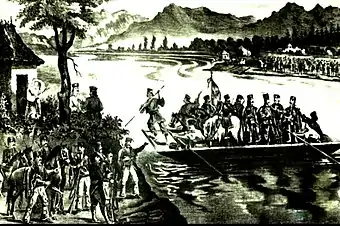Dimitrie Macedonski
Dimitrie Macedonski (c. 1780 or 1782–1843) was a Wallachian Pandur captain and revolutionary leader.[1]
Dimitrie Macedonski | |
|---|---|
| Born | 1780 or 1782 |
| Died | 10 January 1843 |
| Occupation | politician, captain, revolutionary |
| Organization | Wallachan battle fields (1821) |
Life

Dimitrie was born in Macedonia, as the son of Stoyan Mincho (Stogiannis Mintsos), a local chieftain. After the Russo-Turkish wars in the late 18th century the family of Mincho emigrated beyond the Danube. Dimitrie joined the Russian army and became a military officer. He adopted the surname "Macedonski", which referred to his home place.[2]
Macedonski volunteered in the Russo-Turkish War (1806–1812). Afterwards, he was awarded for his bravery and gained the rank of lieutenant.
Later he held different administrative positions in Wallachia and Moldavia.
Taking part in the Greek War of Independence in the Wallachian battle fields, alongside fellow Serbian commander Hadži-Prodan,[3] he was appointed Tudor Vladimirescu's lieutenant by boyar allies of the revolutionaries, on January 15. Sympathetic to the Philikí Etaireía and suspicious of Vladimirescu's level of commitment to the cause, Macedonski, together with Giorgakis Olympios and Iannis Pharmakis, deposed and arrested the rebel leader.
Macedonski was also involved in revolutionary agitation in 1840 Wallachia as a member of a radical conspiracy led by Mitică Filipescu and Nicolae Bălcescu. On April 9, 1841, he was sentenced to eight years in prison, and held at the Snagov Monastery, where he fell ill with dropsy. In early 1843 he was transferred to the Plumbuita Monastery near Bucharest for medical care, but he died on January 10.
He was the grandfather of Romanian poet Alexandru Macedonski.
References
- Hungarian exiles and the Romanian national movement, 1849-1867, Béla Borsi-Kálmán, Sándor Bíró, Social Science Monographs, 1991, ISBN 088033228X, p. 302.
- Thomas Frost, The secret societies of the European Revolution, 1776-1876, pp. 67
- Academia Republicii Populare Romîne. Secția de Științe Istorice, Filožofice și Economico-Juridice (1954). Studii și referate privind istoria Romîniei: din lucrările sesiunii lărgite a Secțiunii de Stiințe Istorice, Filozofice și Economico-Juridice, 21-24 Decembrie 1953. Editura academiei republicii populare romîne. p. 1023.